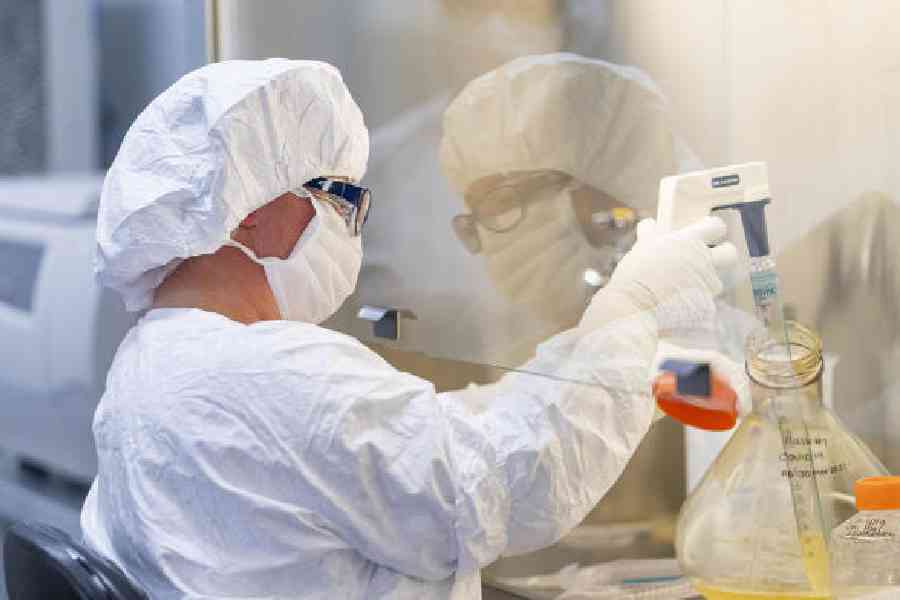To scientists who study it, mRNA is a miracle molecule. The vaccines that harnessed it against Covid-19 saved an estimated 20 million lives, a rapid development that was recognised with a Nobel Prize. Clinical trials show mRNA-based vaccines increasing survival in patients with pancreatic and other deadly cancers.
Biotechnology companies are investing in the promise of mRNA therapies to treat and even cure a host of genetic and chronic diseases, including type 1 diabetes and multiple sclerosis.
But to some state legislators in the US, mRNA therapies are “weapons of mass destruction” and a public health threat. They argue that these vaccines are untested and unsafe and will be pumped into the food supply to “mass medicate” Americans against their will.
Robert F. Kennedy Jr, the nation’s top health official, has inaccurately called
the mRNA shots against Covid “the deadliest vaccine ever made”.
Short for messenger RNA, mRNA exists naturally in every cell of every living organism; its discovery in 1961 was also celebrated with a Nobel Prize. But its association with Covid has thrust it to the centre of a political storm, buffeted by vaccine hesitancy and misinformation, anger over lockdowns and mandates, and the ascendance of the Make America Healthy Again movement in the Trump administration.
States and federal health agencies are playing on wariness about vaccines to cancel research into mRNA more broadly, indicating how much lingering politicisation of Covid is fuelling new attacks on science.
The US National Institutes of Health, which historically has funded the research behind almost every drug on the market, announced that it would shift money that had been spent studying mRNA vaccines to pay for a $500 million grant to study a universal vaccine using traditional, non-mRNA technology. Jay Bhattacharya, a leading critic of the Covid response and the new director of the NIH, called it a “paradigm shift”.
The NIH had already cancelled or paused many grants studying mRNA vaccines and asked for an accounting of all other research it funds on mRNA, which scientists fear is a step toward terminating federal funding.
Scientists and biotech leaders say the demonisation of mRNA will cut short research into promising treatments and cures and send it to other countries where health authorities and investors are rolling out a welcome mat.
“The consequences are enormous,” said Drew Weissman, director of the Institute for RNA Innovation at the University of Pennsylvania, US, and a 2023 Nobel laureate in medicine for the discoveries that enabled the mRNA Covid vaccines. “It has so much potential for other therapies.”
Weissman saw one of his federal grants cancelled and said hundreds of others that study vaccine hesitancy have been terminated, including a half-dozen at Penn, because they mentioned mRNA.
As proof of the promise of mRNA therapies, many scientists point in particular to results published in February showing their success in pancreatic cancer. The disease has a five-year survival rate of 13 per cent; in an ongoing study, an mRNA vaccine has prevented the cancer from returning after four years in some patients.
“It baffles my mind because the mRNA technology has been around for decades, but Donald Trump introduced it to the world; he should be taking a victory lap,” said Jeff Coller, a professor of biomedical engineering at Johns Hopkins and a co-founder of the
Alliance for mRNA Medicines, a trade group started in 2023 in part to counter public misunderstandings about mRNA.
“But somehow, it got warped into mask mandates and shutdowns and the debates over the origins of Covid. These things have become so blurred that people can’t separate it.”
The role of mRNA is to carry the genetic messages from DNA to the ribosomes, instructing them to make the proteins that are the building blocks of any organism.
Used in a vaccine, mRNA delivers a message to make proteins that fight disease, essentially instructing the body to make its own medicine. The proteins can turn on an immune response, to fend off Covid or bird flu or stop cancers from growing. They can also tamp down the overactive immune responses that cause diseases like type 1 diabetes and Crohn’s. Scientists are also exploring mRNA therapies that treat genetic diseases by delivering a correct copy of the flawed gene.
For decades, scientists worried that the technology would not deliver as promised — not because it is not safe but because mRNA breaks down quickly.
Would it stick around long enough to set off the intended immune response? Covid proved that it could and supercharged research into using the same technology to fight other diseases, especially cancers that have resisted traditional therapies.
But the pandemic also supercharged misinformation about the technology. Many of the legislative proposals reflect that.
Proposed bans on mRNA therapies in Montana and South Carolina, for instance, falsely claim that the vaccines are “gene therapies” that can change the human genome and pass on random genetic variations to the next generation, that they are “contaminated” with DNA and other particles, and that they can “shed” to infect others.
In fact, mRNA vaccines cannot change the genetic code, because they cannot access the nucleus of the cells, where DNA resides. Small amounts of DNA are in all vaccines — often, as with the flu vaccine, because they are made from eggs — but the Food and Drug Administration enforces strict limits, and the levels are so small that they
are negligible.
Scientists had been conducting clinical trials on mRNA vaccines against infectious diseases and cancer for years, well before Covid. While no vaccine is without side effects, including deadly ones, the mRNA vaccines often have fewer side effects than traditional vaccines that insert a small amount of live virus.
Melissa Moore, who was chief scientific officer at Moderna when it produced the Covid vaccines, noted that “mRNA is not some foreign substance; it’s something that you’re exposed to all the time”.
NYTNS










